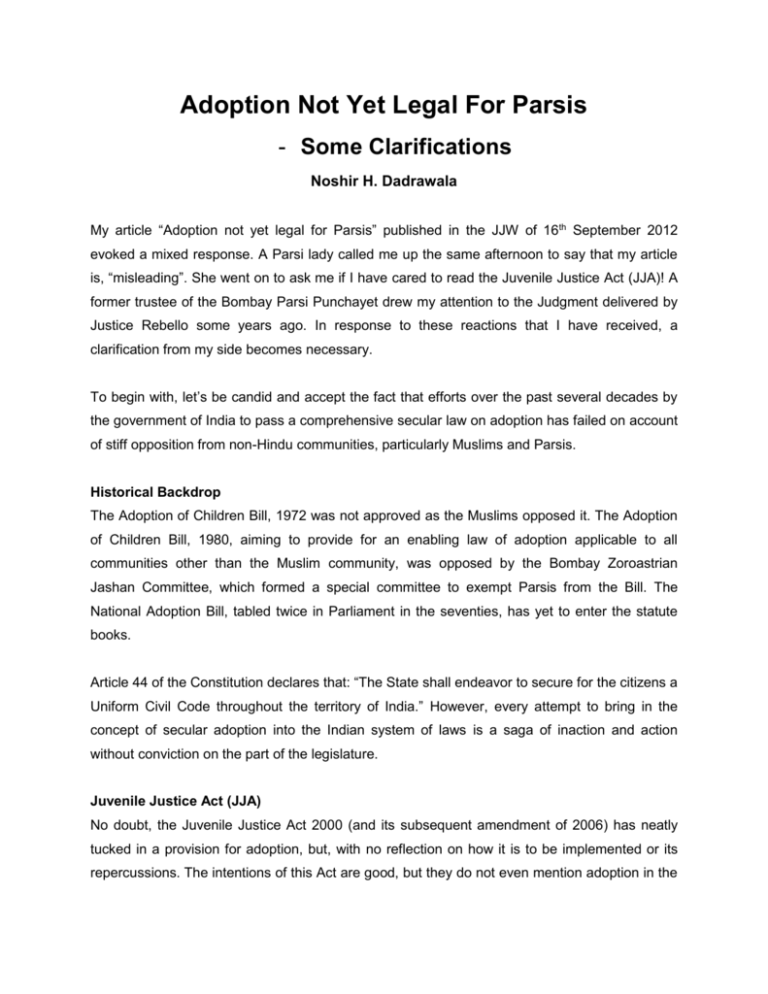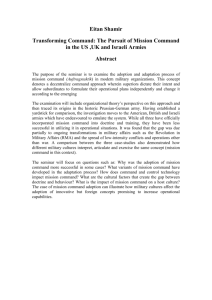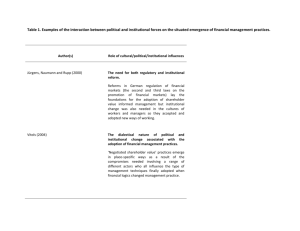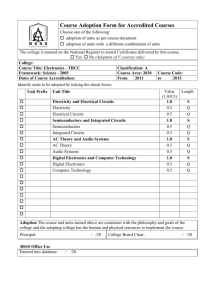Adoption Not Yet Legal For Parsis Some
advertisement

Adoption Not Yet Legal For Parsis - Some Clarifications Noshir H. Dadrawala My article “Adoption not yet legal for Parsis” published in the JJW of 16th September 2012 evoked a mixed response. A Parsi lady called me up the same afternoon to say that my article is, “misleading”. She went on to ask me if I have cared to read the Juvenile Justice Act (JJA)! A former trustee of the Bombay Parsi Punchayet drew my attention to the Judgment delivered by Justice Rebello some years ago. In response to these reactions that I have received, a clarification from my side becomes necessary. To begin with, let’s be candid and accept the fact that efforts over the past several decades by the government of India to pass a comprehensive secular law on adoption has failed on account of stiff opposition from non-Hindu communities, particularly Muslims and Parsis. Historical Backdrop The Adoption of Children Bill, 1972 was not approved as the Muslims opposed it. The Adoption of Children Bill, 1980, aiming to provide for an enabling law of adoption applicable to all communities other than the Muslim community, was opposed by the Bombay Zoroastrian Jashan Committee, which formed a special committee to exempt Parsis from the Bill. The National Adoption Bill, tabled twice in Parliament in the seventies, has yet to enter the statute books. Article 44 of the Constitution declares that: “The State shall endeavor to secure for the citizens a Uniform Civil Code throughout the territory of India.” However, every attempt to bring in the concept of secular adoption into the Indian system of laws is a saga of inaction and action without conviction on the part of the legislature. Juvenile Justice Act (JJA) No doubt, the Juvenile Justice Act 2000 (and its subsequent amendment of 2006) has neatly tucked in a provision for adoption, but, with no reflection on how it is to be implemented or its repercussions. The intentions of this Act are good, but they do not even mention adoption in the statement of object! Thus, the JJA is not precise and clear in its terms and is in reality, in conflict with other pieces of legislation. One needs to note that nowhere does the Juvenile Justice Act 2000 (or the amendment of 2006) say that it supersedes existing legislation on adoptions. JJA fails to override the provisions of other personal laws. For example the Muslim personal law does not permit adoption and the government can’t try and plug loopholes in one Act by amending another. Merely because the JJA has included adoption within its ambit, this is still not an all-in-all adoption law, but brings in adoption as one of the means by which abandoned, neglected, abused and destitute children could be rehabilitated. The Act recognizes adoption as an important process in the rehabilitation and social re-integration of children who are abandoned, orphaned, neglected or abused in their families or in institutions. Given its special status within the broader framework of child welfare programme, adoption demands a class of legislation that must either supersede or made compatible with the existing legislation. The existence of a prior law relating to adoption for Hindu and the non-existence of adoption laws for non-Hindu communities as also, prohibition of adoption in the religious laws of some communities (e.g. Muslims) makes the JJA rather ineffective. It is a well-settled principle of Jurisprudence that when there is a ‘general law’ and a ‘specific law’ on the same aspect of law, the latter has precedence over the former. Consequently, the Juvenile Justice Act is rendered ineffective by the very presence of Hindu Adoptions and Maintenance Act, 1956, in case of Hindus. Regarding the conflict between the Act and the existing legislation, naturally, the multiplicity of laws, each with their own set of operational rules, causes chaos in the field. With regard to the case of Manuel Theodore, where 'in the absence of legislation', the Bombay High Court recognized the right of a Christian parent to adopt a destitute and orphaned child, Justice Rebello interpreted Article 21 to hold that 'the right of the child to be adopted and consequently to have a home, a name and a nationality has to be considered as part of his right to life.' Interesting, the Court goes on to recognize a right to adopt on part of the parents flowing from Article 14. The Court here strayed into the area of personal law. Though adoption by itself is a fundamental right of an orphaned, abandoned or destitute child, the legal consequence of being given in adoption entails application of Family Law or what is termed as Personal law. In the final analysis, it can be said that though the JJA was framed with bonafide intent, yet it has paved way to a number of doubts and difficulties in its practical implementation. The Muslims challenge the constitutionality of the provision (section 41 of the Juvenile Justice (Care and Protection of Children) Act, 2000) per se, since the concept of adoption runs contrary to the injunctions of the Holy Koran and their Personal Law. Even among the Parsis the custom of naming a ‘palak’ for undertaking obsequies of a deceased cannot be confused with adoption. Hence, while it is true that the amendment of 2006 to the JJA 2000 has now defined 'Adoption' under section 2(aa) to mean "the process through which the adopted child is permanently separated from his biological parents and become the legitimate child of his adoptive parents with all the rights, privileges and responsibilities that are attached to the relationship", in view of what has been stated above Parsi parents adopting children are advised out of abundant precaution to execute testamentary and other documents to ensure the child’s right of inheritance.





